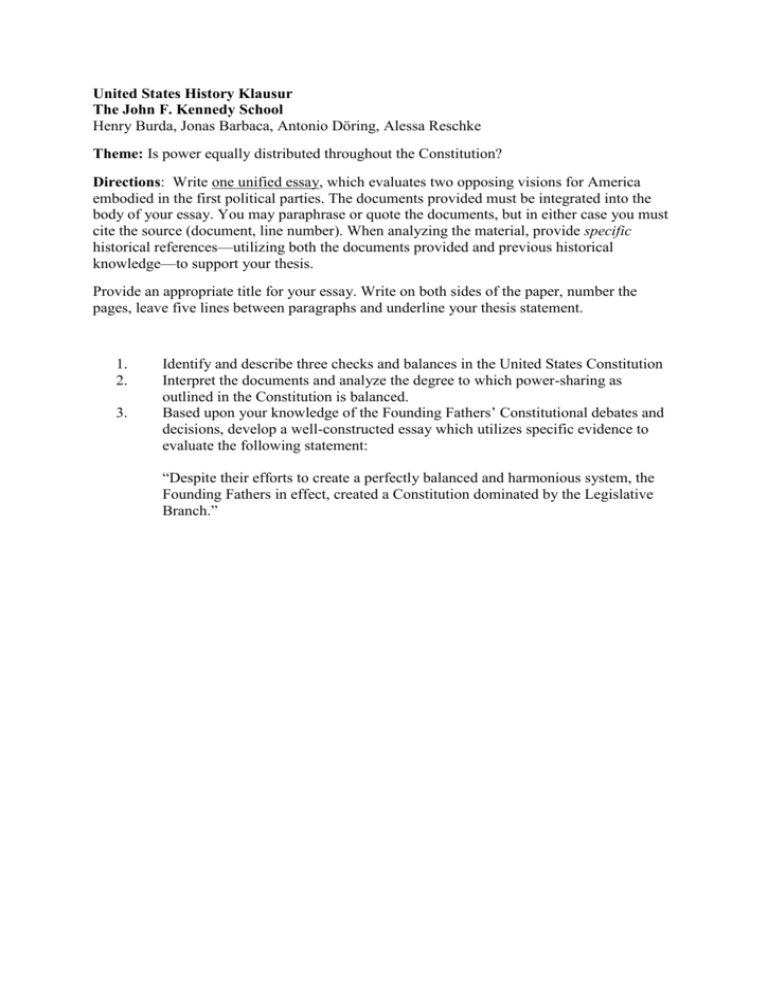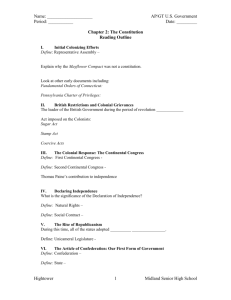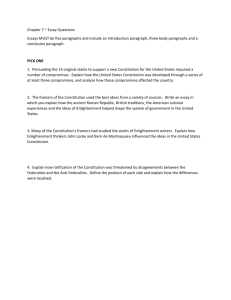To what extent is power equally distributed among the three
advertisement

United States History Klausur The John F. Kennedy School Henry Burda, Jonas Barbaca, Antonio Döring, Alessa Reschke Theme: Is power equally distributed throughout the Constitution? Directions: Write one unified essay, which evaluates two opposing visions for America embodied in the first political parties. The documents provided must be integrated into the body of your essay. You may paraphrase or quote the documents, but in either case you must cite the source (document, line number). When analyzing the material, provide specific historical references—utilizing both the documents provided and previous historical knowledge—to support your thesis. Provide an appropriate title for your essay. Write on both sides of the paper, number the pages, leave five lines between paragraphs and underline your thesis statement. 1. 2. 3. Identify and describe three checks and balances in the United States Constitution Interpret the documents and analyze the degree to which power-sharing as outlined in the Constitution is balanced. Based upon your knowledge of the Founding Fathers’ Constitutional debates and decisions, develop a well-constructed essay which utilizes specific evidence to evaluate the following statement: “Despite their efforts to create a perfectly balanced and harmonious system, the Founding Fathers in effect, created a Constitution dominated by the Legislative Branch.” Document A: James Madison in the Federalist No. 51 Ambition must be made to counteract ambition...It may be a reflection on human nature that such devices should be necessary to control the abuses of government. But what is government itself, but the greatest of all reflections on human nature? If men were angels, no government would be necessary...In framing a government which is to be administered by men over men, the great difficulty lies in this: you must first enable the government to control the governed; and in the next place oblige it to control itself. Document B: Jim Hightower Is a Presidential Coup Under Way? 2007. Hightower (1943 - ) is an American syndicated columnist, progressive, political activist, and author who served from 1983-1991 as the elected commissioner of the Texas Department of Agriculture. "Separation of powers. Rule of law. Checks and balances. These may seem to us moderns to be little more than a set of dry, legal precepts that we had to memorize in high-school history class but need not concern us now. After all, the founders established these principles for us back in 17-something-or-other, so we don't really have to worry about them today. Think again. These are not merely arcane phrases of constitutional law, but the very keystones of democracy, essential to sustaining our ideal of being a self-governing people, free of tyrants who would govern us on their own whim. The founders knew about tyranny. The monarch of the time, King George III, routinely denied colonists basic liberties, spied on them and entered their homes at will, seized their property, jailed anyone he wanted without charges, rounded up and killed dissidents, and generally ruled with an iron fist. He was both the law and above the law, operating on the twin doctrines of ‘the divine rule of kings’ and ‘the king can do no wrong’… The Bush Administration is not merely pushing executive supremacy as a response to an outside threat, but as an ideological, right-wing theory of what they allege the Constitution actually meant to say. Called the "unitary executive theory"* this perverse, antidemocratic construct begs us to believe that the president has inherent executive powers that cannot be reviewed, questioned, or altered by the other branches. Bush himself has asserted that his executive power ‘must be unilateral and unchecked.’ Must?” *A theory of American constitutional law holding that the President controls the entire executive branch. The doctrine is based upon Article Two of the United States Constitution, which vests "the executive power" of the United States in the President. Although that general principle is widely accepted, there is disagreement about the strength and scope of the doctrine.











